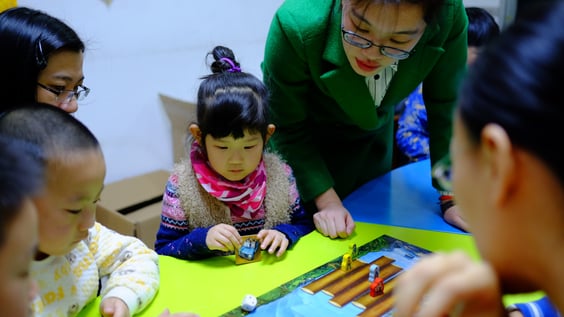Have you ever wondered why some children struggle to make progress in learning a new language? It often boils down to a mental obstacle known as the affective filter.
In this blog post, we'll explore how emotions, attitudes, and the learning environment shape the language learning experience for young learners. Let's dive in and discover how we can create a positive and nurturing environment that helps children thrive by lowering the affective filter.
What Is the Affective Filter?
The affective filter is a metaphor used to describe the emotional and psychological barriers that can hinder language learning. You can think of it as a wall that is built from a combination of emotions and attitudes towards the new language, the learning situation, and the learner’s own abilities. It surrounds a learner's mind and heart, blocking them from fully understanding and absorbing the words and structures of a new language.
When the affective filter is high, the wall goes up and it becomes difficult for children to absorb and remember new language information. Anxiety, stress, discomfort, boredom, lack of motivation, self-consciousness, and fear of making mistakes can raise the affective filter.
On the other hand, when the affective filter is low, the wall comes down, and children can focus and absorb the new language more effectively. Excitement, motivation, self-confidence, and a sense of safety in the learning environment can help keep the affective filter low. As educators, our mission is to lower this filter so that children can tap into their full learning potential.
Young learners are especially susceptible to the influence of the affective filter because they are still developing their emotional skills. The good news is that educators have many ways to help young learners overcome discomfort and succeed in learning a new language.

Activities to Lower the Affective Filter
Total Physical Response (TPR) invites learners to respond with physical actions instead of words. Consider follow-the-leader games like Simon Says, answering questions with movements (e.g., clap for "yes," squat for "no"), or vocabulary games where learners touch or move to the vocabulary item being taught. Almost any activity can be turned into a TPR activity. TPR reduces stress and anxiety, engages the whole body in learning, and helps children connect words with actions.
Stories are magical tools that capture children's imagination and provide a context for language learning. They offer rich language input, and the accompanying illustrations and materials support comprehension. When the focus is on an engaging story, children quickly forget their fears and anxieties about language skills.
You can pair stories with activities like role-playing or puppet shows where children act out the story. These kinds of interactive activities are highly engaging for children. When children reenact a story, they don't have to worry about creating a storyline themselves. Playing a role can also reduce the anxiety of speaking because children are speaking as the character and not as themselves.

Songs and rhymes not only enhance vocabulary, rhythm, and pronunciation skills but also help lower the affective filter. Children love singing and rhyming, so these activities naturally engage them. The predictable rhythm, rhyming couplets, and repetitive lyrics make songs and rhymes easy to remember. Plus, speaking won't feel as scary when done as a group.
Create a Supportive Learning Environment
Engaging activities are important, but learners also need to feel comfortable, accepted, and supported in the learning environment. Remind children that mistakes are opportunities for learning, not something to laugh at or be ashamed of. Encourage them to help and speak kindly to each other, creating a strong sense of community. Children learn by example, so let your own supportive and encouraging behavior serve as a model for them.
Supporting children's self-confidence is important for lowering the affective filter. When children believe in themselves and their abilities, mistakes won't feel as devastating. Celebrate their small achievements and provide opportunities for them to showcase their language skills. Offer constructive feedback to guide their progress. Encourage them to share their opinions and show genuine interest in them as individuals. Strengthening children’s self-awareness helps them build confidence in themselves.

As educators, we hold the key to unlocking the potential of our young language learners. With empathy, patience, and well-designed strategies, we can break through the barriers that hinder language acquisition and guide children to explore the wonders of language with joy and confidence.
Moomin Language School is a play-based early language learning program for learning organizations. Would you like to try it out for yourself? Apply for a free trial month here:
.


